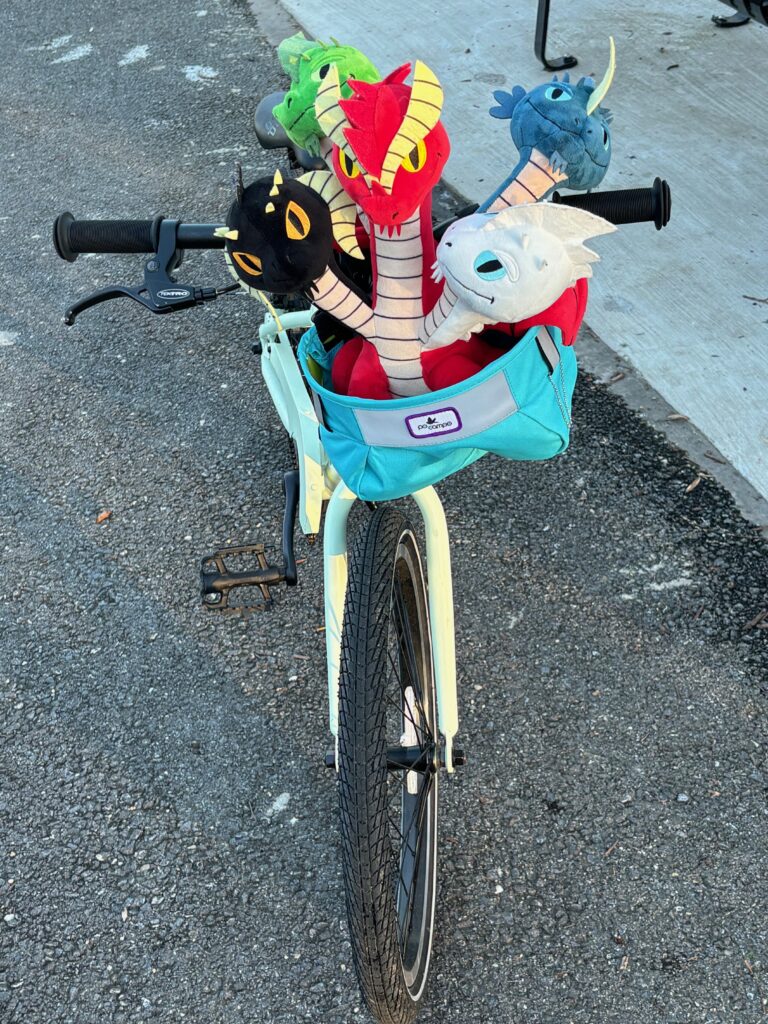
Feet pushing confidently on his pedals, riding his bike in loops around the park, I see the stress melt away from my older son. I’ve described it as moving meditation for him. He’s an emotionally intense kid, but other forms of meditation just didn’t meet his needs. They were often too quiet or too still. Biking fulfilled that need to move, his body in sync with his mind and everything else.
I know my kid isn’t the only neurodivergent kid for whom biking helps. (For those not familiar, neurodivergent refers to any person whose brain doesn’t match the “typical” brain. It includes autistic people, people with ADHD, people with depression, anxiety, dyslexia, and more.) In fact, there are many environmentally friendly activities that can help kids (and adults) with some of the challenges that come with being neurodivergent. Even if you and your kids are neurotypical, these activities have many of the same benefits. This is actually what much of my book is about!
Being outdoors
For many people, being outdoors is inherently relaxing. It engages your senses without being overwhelming the way screens or other exciting activities can be. According to research from the University of Minnesota, being outside can reduce anger, fear, and stress. This stress relief can be particularly important for people who have depression or anxiety. I know just getting outdoors can allow me to breathe deep and drop my shoulders. In addition, many people who are sensory avoidant have problems with objects that are mainly indoors – bright fluorescent lighting, electronic equipment that makes buzzing noises, walls that echo noises. Much of the time, being outdoors can provide a restful counterpoint. It can even help people have better focus, even after they go inside! Research with kids with ADHD showed they had longer attention spans on tasks after being in green outdoors spaces.
Wildlife watching
A lot of neurodivergent people – particularly autistic people – relate strongly to animals. Watching wildlife such as birds or squirrels can be relaxing and help kids develop an appreciation for small joys in life. Birdwatching in particular can be great for kids who love collecting or checking off items on a list. Appreciating wildlife also builds a love for nature that can lead to environmentally sustainable values and attitudes later.
Gardening
As no one can truly control what happens in a garden – you can’t force a plant to sprout! – gardening teaches flexibility, patience, and persistence. These can be big challenges for autistic kids or kids with anxiety. The “heavy work” involved in gardening like shoveling or dragging around bags of soil can provide the sensory input that’s helpful to a lot of kids with ADHD. For kids who like ripping paper up as a stim or fidget, composting is fantastic. Just drop those ripped-up newspapers in the composter to balance out the food waste! Literally getting your hands dirty can also help boost kids’ immune system. As a lot of neurodivergent people have weaker immune systems due to extended stress from the outside world and gardening can potentially help. Lastly, if you grow vegetables, growing your own food can make kids more likely to eat it. A lot of autistic kids and kids with sensory sensitivities struggle with eating produce, so anything that helps in that realm is good.
Biking and walking for transportation
A lot of forms of neurodivergence like ADHD come with a need to move more often and more in total than most people. In addition, some forms come with a lack of proprioception, a good sense of where your body is in space. Biking and walking for transportation can help both of these needs! It builds movement into the day as a part of your schedule rather than the logistics of trying to get your kids back out of the house (again). Because kids are getting around on their own power and eventually can get around without being driven by parents, it also builds a sense of independence and confidence. That’s especially important for kids who adults frequently underestimate and are (incorrectly) less likely to see as capable. Public transit doesn’t have the same benefits in terms of movement, but also builds independence and doesn’t require kids be physically restrained in the same way car seats do. My kids have always loved buses and trains way more than the car.
Environmental activism
Even for kids who don’t have major anxiety or depression, issues like climate change and species extinction can be pretty stressful. It’s even worse if your neurology bends in that direction already. Finding meaning in taking action is one way to stave off those effects. Instead of only engaging in individual environmental activities alone, participating in activism builds relationships and contributes to a sense of community.
It also helps kids feel empowered, which is essential when it feels like so much can be outside of your control. Autistic kids often feel very big feelings about injustice in the world and feel like there’s nothing they can do about it. In fact, dealing with the mental health effects of climate change was what led Greta Thunberg (who is autistic) to engage in activism. After hearing about the potential effects of climate change, she felt so anxious about it that she developed an eating disorder. Striking for the climate gave her a sense of control and helped her recover from her eating disorder.
If your kids or you are neurodivergent, have you felt any of these activities have helped you?